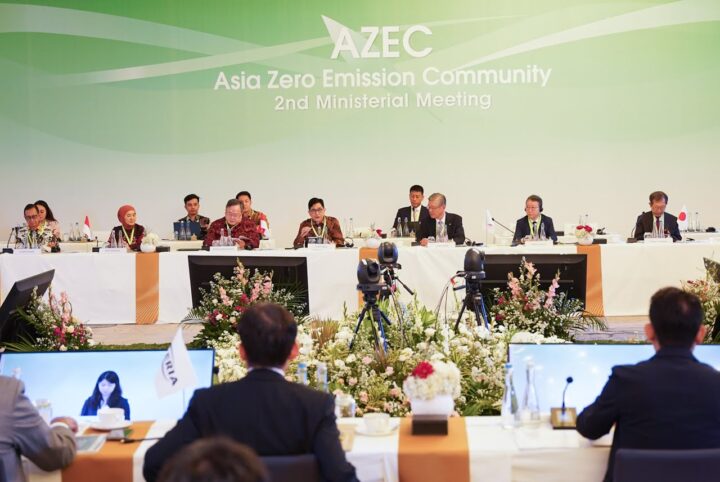
Chairman of Kadin Indonesia and Chairman of ASEAN-BAC Indonesia Arsjad Rasjid said that the commitment to achieve net zero emission (NZE) should not be at the expense of the rapid growth in the Asian region. "A balance must be maintained between the implementation of sustainability principles and high economic growth," he said.
The statement was made during the "Asia Zero Emissions Community (AZEC) Advocacy Group Roundtable" meeting supported by Kadin Indonesia, through the ASEAN Business Advisory Council (ASEAN-BAC) Indonesia, in collaboration with the Economic Research Institute for ASEAN and East Asia (ERIA) and the Japan Business Federation (Keidanren) today, Tuesday (20/8/2024).
The AZEC Advocacy Group Roundtable was the first to be held as a follow-up to the signing of a Memorandum of Understanding (MoU) on the establishment of the AZEC Advocacy Group by Keidanren, the ASEAN Business Advisory Council, and ERIA at the Summit to Commemorate 50 Years of ASEAN-Japan Friendship and Cooperation on 18 December 2023 in Tokyo, Japan.,
On the occasion of the AZEC Advocacy Group Roundtable, Arsjad revealed that the commitment to achieve zero emissions must be harmonised with the conditions in each country, so that the potential for Asia's rapid economic growth must also be maintained. Indonesia, he said, has a strong commitment to achieve a net-zero economy by 2060 or sooner.
International initiatives such as AZEC are very important in balancing the commitment to achieve zero emissions and economic growth. As such, the AZEC Advocacy Group aims to be a platform for the private sector to realise solutions and voice aspirations regarding the energy transition.
"We cannot afford to lose the opportunity (of rapid economic growth), given that there is a shift in global growth to Asia. The key is to find a balance," said Arsjad Rasjid.
Arsjad further reminded that the global approach to energy transition must take into account the complexity of energy needs and economic landscapes in various countries in Asia. Therefore, it is necessary to encourage the approach of energy security and transition as parallel and interrelated methods for Asian countries.
Arsjad reminded that energy security is very important. Not only does it support new industries or ensure people's access to health and education, but also viable economic opportunities. However, at the same time, Asian countries must also shift to a greener and more sustainable approach.
With the Indonesian government's commitment to developing a "Pro-Growth, Pro-Welfare, and Pro-Green" economic framework, Arsjad Rasjid hopes that forums like AZEC will invite other broader international cooperation, thus becoming an important platform for collaboration across countries and sectors. He emphasised the importance of aligning this vision with private sector contributions in Asia to ensure an inclusive energy transition.
"We share the same spirit with AZEC: 'Asia's Transition, Asia's Solution, Asia's Transition, Asia's Pathway'. This narrative has the potential to become a shared narrative in a larger forum later, for example at COP-29 in Azerbaijan. However, this must be aligned inclusively with the contribution of the private sector in this region," said Arsjad.
Arsjad also explained that the AZEC Advocacy Group is not only promoting national interests, but also supporting more inclusive regional economic development. "We want to ensure that the contribution of the private sector is recognised and integrated in Asia's sustainable energy transition efforts," he said.
Keidanren Managing Director Arihiro Iwamura added that AZEC acts as a platform to ensure that economic growth and carbon neutrality can be achieved simultaneously by industries across Asia. "AZEC was formed to achieve two main targets, namely economic growth and carbon neutrality, which must be realised simultaneously by industry players in every country in Asia," he said.
Meanwhile, ERIA President Prof. Tatsuya Watanabe emphasised that the success of Asia's sustainable economic transition relies heavily on each country's ability to integrate the right technologies, while respecting their own specific needs and challenges. "Countries in Asia have a common goal of achieving optimal economic growth while respecting the specific needs of each country. One of our main focuses is how technology can be utilised to support the transition to a more sustainable economy," he said.
ASEAN-BAC Laos 2024 Chairperson Oudet Souvannavong stated that the discussions at this meeting did not only focus on technology, but also on the importance of collaboration between Asian countries. "This collaboration requires technological support and adequate funding to be realised effectively," he said.
The AZEC Advocacy Group Roundtable brought together business leaders, governments and energy experts to exchange knowledge and solutions related to energy transition. The main agenda includes discussions on the landscape and challenges of the energy transition in Asia, effective national and regional frameworks, and the best financing schemes. The initiative is also a testament to Kadin Indonesia's commitment in supporting the zero emission target by 2060 or sooner in line with Indonesia's national commitments under the UNFCCC.
National Economy
Regional Economy